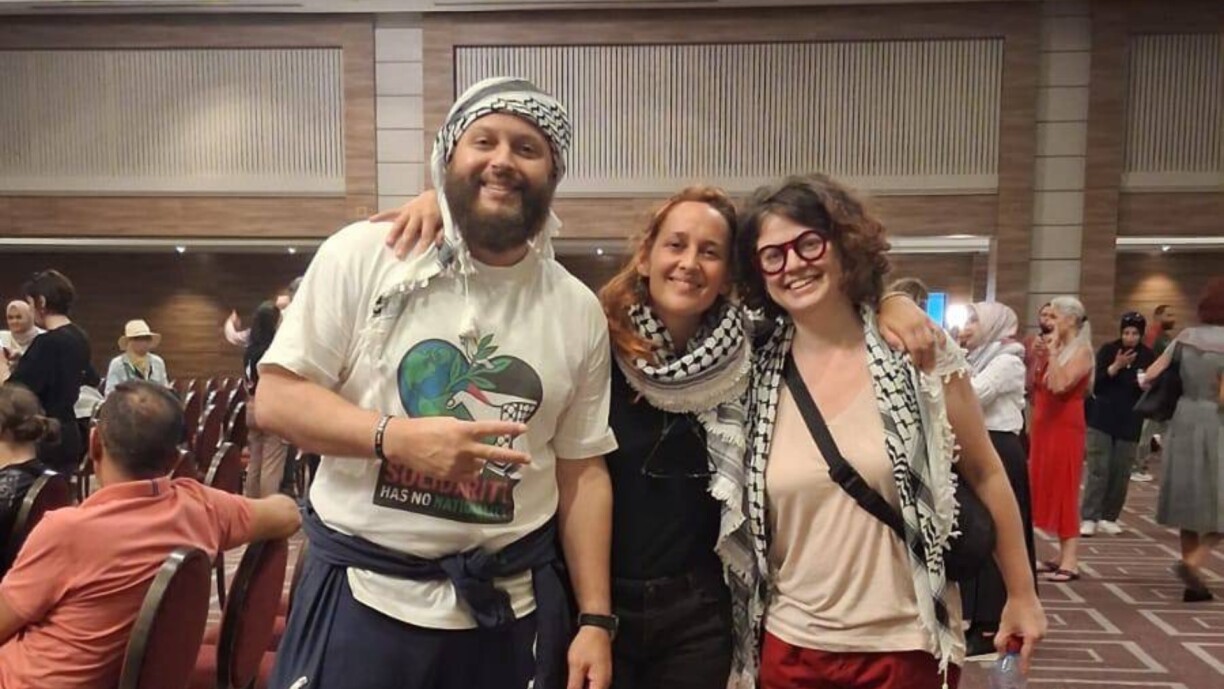
Hundreds of activists from 44 countries, including Luxembourg and as far as Australia and Colombia, are readying to set sail in a flotilla of boats to challenge Israel’s blockade of Gaza. The first ships left earlier this week and are now heading toward Tunis, where more vessels are expected to join before attempting to reach Gaza around mid-September.
Among them is Luxembourgish volunteer Maya Garman, Global Sumud Flotilla (GSF) coordinator and one of three Luxembourgers on board, who shared a glimpse into the preparations ahead of departure from Tunis.
The first plans for the Sumud flotilla – which means steadfastness in Arabic – were drawn up weeks after the crew of the Madleen ship was intercepted by the Israeli military in international waters.
“It was a crazy job”, notes Garman, who alongside the other coordinators put her life on hold for two months before departure. From boats to crews to security and welfare needs, every single detail had to be considered.
“The first thing we dealt with were the boats and crews, of course.” Each boat sailing in the convoy has a precise and mandatory composition of captain, skipper, first mate, technical engineer, journalist, and a medic. “If the boat doesn’t have this basic crew, it’s not leaving the port.”
Once the crew was secured, the organisers moved into mobilising volunteers, who are all undergoing rigorous training at the time this interview was conducted. “We cannot afford to put people on boats and hope they will be fine, because we know that we will be confronted with an army with guns – and there have been previous dangerous precedents”, alluding to the Mavi Marmara raid in 2010 that resulted in the death of ten activists.
“We’re facing an immoral army that is protecting and enacting a genocide, so every single participant was brought here ahead of the launch to be trained.” Each class records presences and absences to ensure only those who have undergone all the modules actually set sail.
The trainings range from media and legal literacy, to individual welfare, but also about life at sea. Garman explains that the majority of the participants have no prior experience, so aspects like sea sickness or living in such close proximity to strangers might be a challenge. “These boats have crews of ten, 20, 30, up to 50 people on them, so they need to learn how to create cohesion despite our differences. But the participants are ready to set everything aside – their differences, their problems, their illnesses – none of it matters right now.”
The biggest chunk of training is dedicated to non-violence, stresses Garman. After all, the GSF understands itself as a non-violent movement, meaning the volunteers will not resort to violence in the case of an attack. “We don’t have guns, we just have humanitarian aid, food, water, and ourselves – that’s all.”
During training, participants are put into simulations, with their reactions and communicative styles being carefully evaluated by the coordinators. “We have to make every participant understand that whatever happens, they have to maintain non-violence, even in violent situations.” If they react too strongly, or if they panic, they are ultimately asked not to depart.
Coordinators like Garman arrived in Tunis two weeks ago to ensure the convoy could depart as smoothly as possible, but their days remain packed nonetheless. “I have really long days”, she chuckles.
“I wake up in my room here, then I have breakfast with whoever is around – today, for instance, I ate with the Malaysian delegation – before we all head into training, close to our accommodation. After that, I do paperwork, have lots of coordination meetings to discuss what needs have to be met, who goes on which boat, what to do with our VIPs, and so on. Just a lot of meetings and lists, really. But of course, we also mingle a lot.”
At the time of the interview, the allocation of activists to each vessel had yet to be confirmed. What is sure, however, is that they won’t be organised according to nationality. “Thank God we don’t have a Luxembourgish boat, because there’s only three of us”, she jokes.
With some nationalities being more at risk than others, the organisers opted for a mixed approach – though the decision goes far beyond logistics. “The idea is that I’m not a Luxembourger when I’m here, I’m just a human being,” pointing to the slogan of the March to Gaza, which Garman also attended, titled ‘solidarity has no nationality’ as a cornerstone behind the GSF’s philosophy.
As to concerns and fears for the journey ahead, Garman added a bit of lightheartedness. “I’m mostly worried about sea sickness,” she laughs, before quickly turning serious. “Of course I have concerns – we’re going into a war zone, and I know their military is no joke – but I couldn’t look at myself in the mirror if I stayed home.”
What gives her courage, she says, is the solidarity she has found in Tunis: strangers from 44 countries who have become like family. “It gives you strength to know you’re not alone in this frustration, that people from all over the world are ready to put everything aside just to say: we are humans, nothing else matters right now. If it were my own family, of course I would go. So why not do the same for them?”
Disclaimer: At the time of writing, Maya Garman and the Luxembourgish delegation had not yet departed from Tunis. RTL Today will continue to follow developments in the coming weeks, subject to logistics, weather conditions, and security factors. You can also follow the journey via the GSF’s tracker.